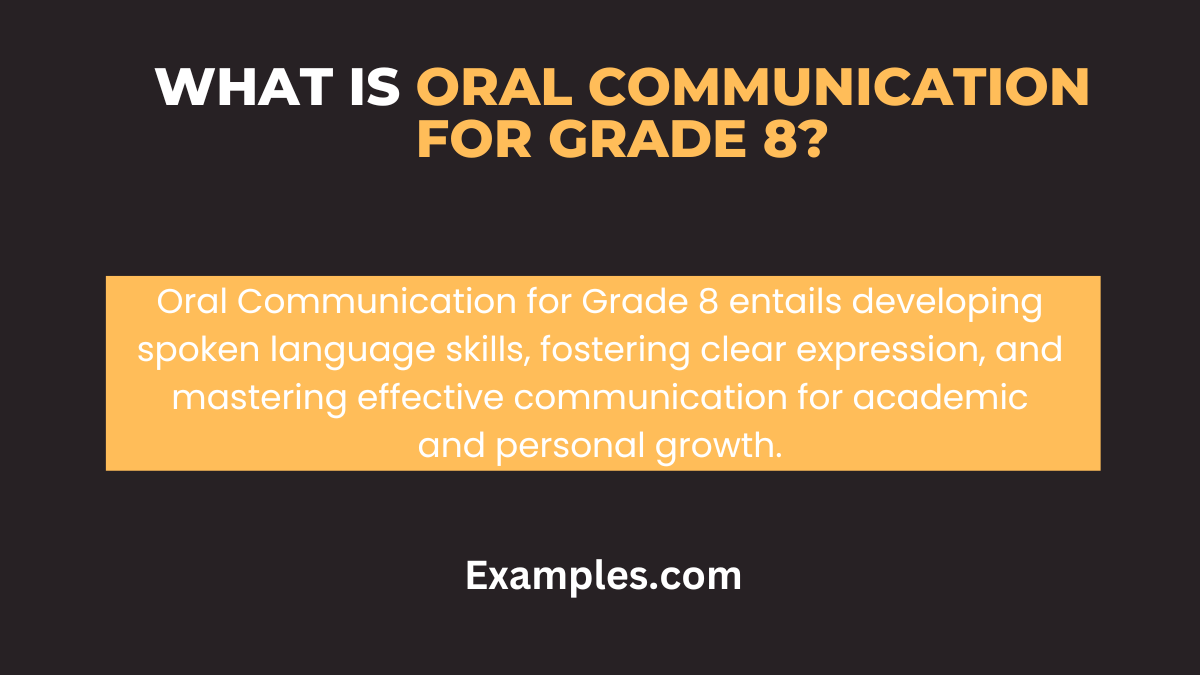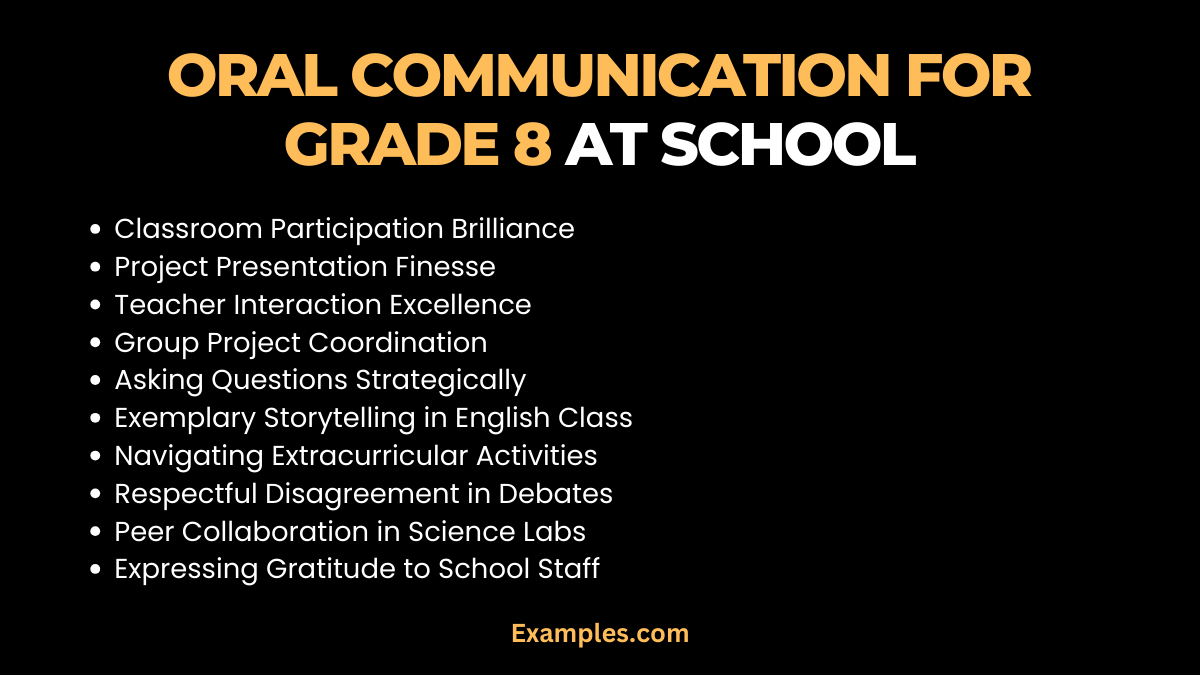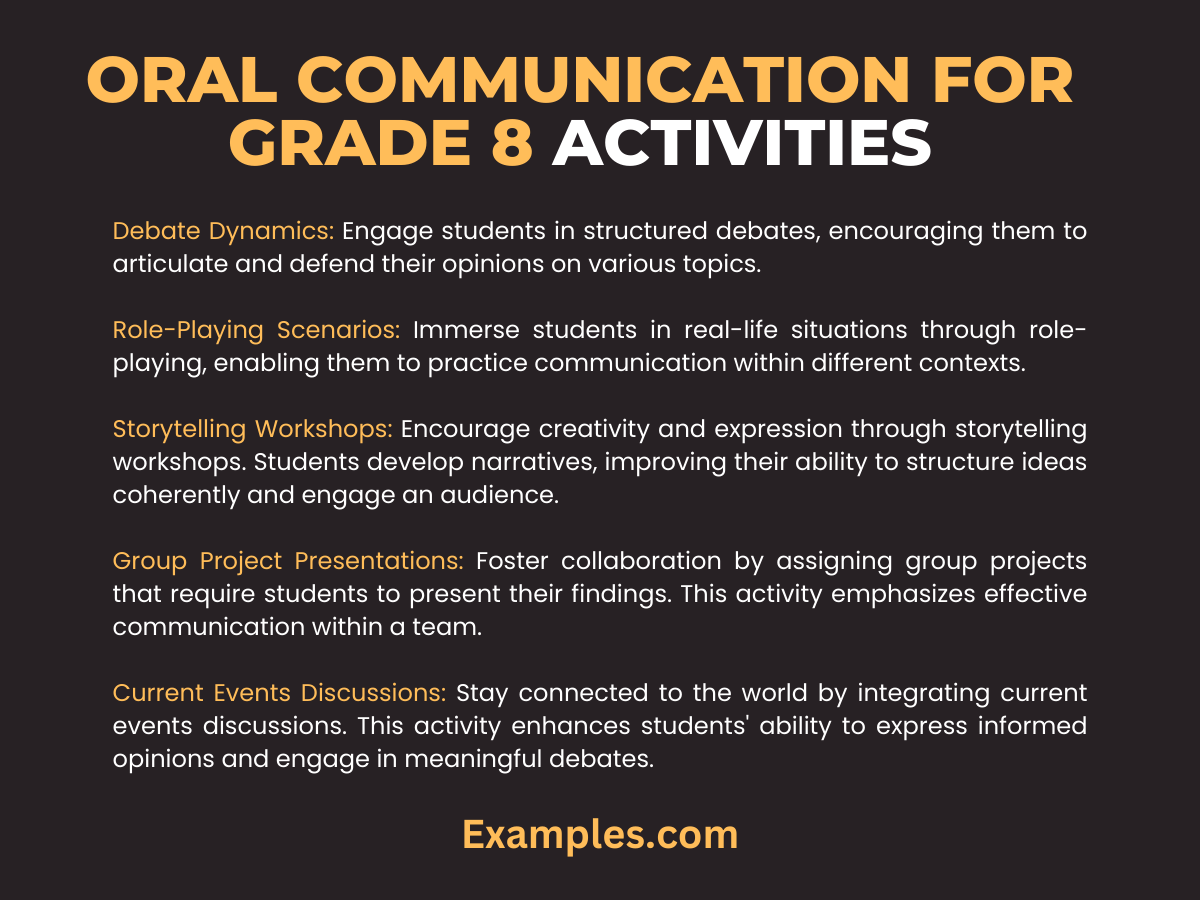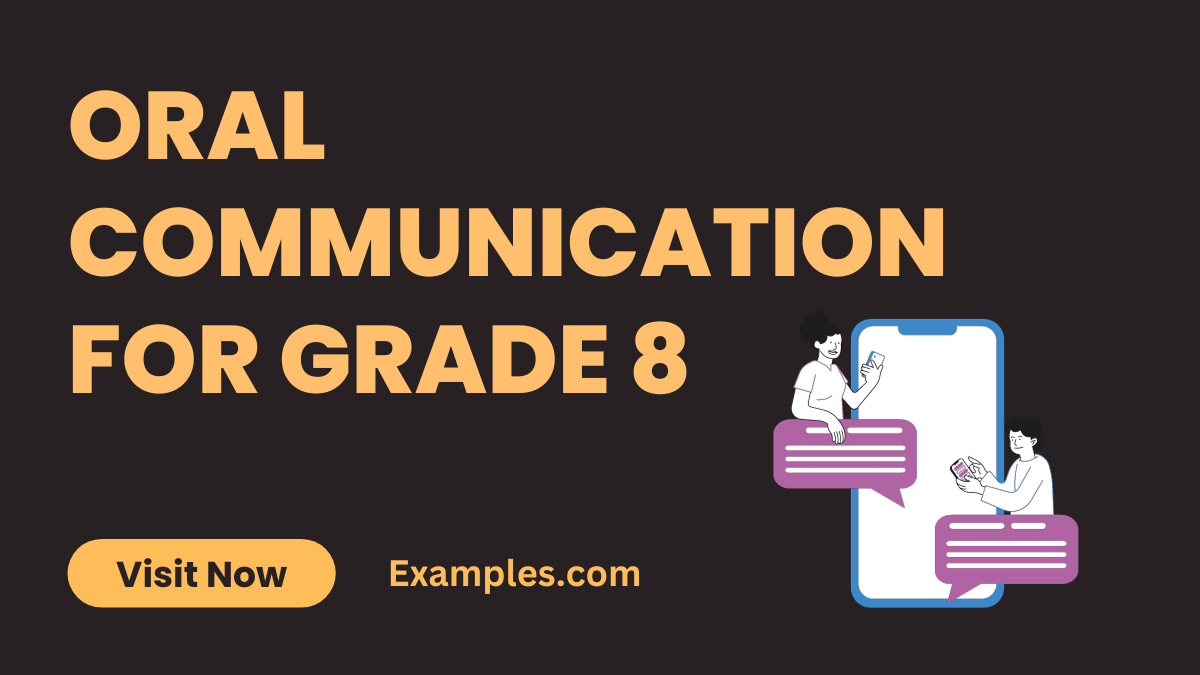29+ Oral Communication for Grade 8 Examples
Welcome to the comprehensive guide on Oral Communication for Grade 8, your go-to resource for mastering the art of expression. In this enriching guide, we explore key facets of effective communication, providing illuminating examples that seamlessly blend theory with practice. Navigate the nuances of Grade 8 communication with ease, as we delve into insightful tips and strategies. Embark on a journey of growth, where every concept is brought to life through vivid Communication Examples, ensuring a transformative learning experience.
What is Oral Communication for Grade 8?

Oral Communication for Grade 8 refers to the process of conveying thoughts, ideas, and information through spoken language, specifically tailored for eighth-grade students. It involves the development and application of effective communication skills, encompassing verbal expression, active listening, and the ability to articulate thoughts coherently. This pivotal skill set empowers Grade 8 students to engage in meaningful dialogues, presentations, and discussions, fostering both personal and academic growth. Explore this section for a clear and concise definition, setting the foundation for mastering effective communication in Grade 8.
What is the best Example of Oral Communication for Grade 8?
Unlock the essence of effective communication with the best example tailored for Grade 8 students. Imagine a scenario where a student confidently presents a class project, employing clear articulation, engaging tone, and well-organized content. This exemplary instance showcases not only the mastery of verbal expression but also the ability to capture the audience’s attention. Through a detailed exploration of this standout example, students gain valuable insights into the key elements that define remarkable oral communication in Grade 8. Dive into this illuminating breakdown for a comprehensive understanding.
30 Oral Communication for Grade 8 Examples
Embark on a journey of effective communication with our curated collection of 30 Oral Communication for Grade 8 Examples. Each example is a testament to the art of expression, covering a spectrum of scenarios relevant to eighth-grade students.
1. Classroom Collaboration: Engage peers with clarity and confidence, fostering a conducive learning environment.
Example: During group projects, articulate ideas clearly to ensure seamless collaboration.
2. Presentation Prowess: Ace oral presentations by mastering the balance of information and engagement.
Example: Delivering a science project presentation with enthusiasm and structured content.
3. Debate Dynamics: Navigate discussions adeptly, expressing opinions persuasively.
Example: Effectively argue a chosen stance in a class debate, considering counterarguments.
4. Storytelling finesse: Capture attention with compelling narratives, enhancing communication impact.
Example: Craft a vivid story during English class, utilizing descriptive language and engaging plot twists.
5. Peer Support Conversations: Develop empathy and active listening in supportive discussions with classmates.
Example: Offer encouragement and understanding in conversations with a friend going through a challenging time.
6. Interview Etiquette: Showcase professional communication skills for future success.
Example: Simulate a job interview scenario, demonstrating confident responses and professional demeanor.
7. Expressing Gratitude: Cultivate positive relationships by articulating appreciation sincerely. Example: Thank a teacher for guidance with a heartfelt and well-communicated note.
8. Resolving Conflict: Navigate disagreements constructively, fostering harmony within the school community.
Example: Mediate a disagreement between classmates, facilitating a resolution through effective communication.
9. Group Decision-Making: Contribute meaningfully to group discussions, ensuring collective decisions benefit all.
Example: Collaborate on choosing a class project theme, considering diverse perspectives.
10. Classroom Questioning: Pose thoughtful questions to enhance participation and critical thinking.
Example: Engage actively in class discussions by asking relevant and insightful questions.
11. Digital Communication: Navigate online discussions responsibly, considering the impact of written words.
Example: Participate in a virtual classroom discussion, demonstrating clear and respectful online communication.
12. Expressing Concerns: Communicate concerns with teachers or peers diplomatically for effective problem-solving.
Example: Discuss academic challenges with a teacher, seeking guidance and proposing solutions.
13. Reflective Communication: Articulate personal reflections clearly, deepening self-awareness. Example: Share insights gained from a class activity, connecting personal experiences to the learning material.
14. Team Collaboration: Contribute meaningfully to group projects, ensuring a harmonious and efficient workflow.
Example: Work collaboratively on a science experiment, coordinating efforts for a successful outcome.
15. Social Media Awareness: Communicate responsibly on social platforms, considering the broader impact.
Example: Share educational content on social media, promoting awareness while maintaining a positive online presence.
16. Public Speaking Mastery: Excel in addressing larger audiences with confidence and clarity. Example: Deliver a speech during a school assembly, captivating the audience with a well-structured and engaging presentation.
17. Nonverbal Communication: Master the art of nonverbal cues to enhance spoken messages. Example: Use appropriate gestures and facial expressions to convey enthusiasm during a class discussion.
18. Critical Listening Skills: Hone the ability to actively listen and comprehend complex information.
Example: Engage in a debate, demonstrating the skill of listening carefully to counterarguments and responding thoughtfully.
19. Cultural Sensitivity Conversations: Communicate respectfully in a diverse environment, considering cultural nuances.
Example: Engage in discussions about cultural differences, fostering mutual understanding within the class.
20. Community Outreach Communication: Effectively convey information during community outreach activities.
Example: Communicate the importance of a local charity event, encouraging participation and support.
21. Goal Setting Conversations: Articulate personal and academic goals, fostering a growth mindset. Example: Share future aspirations during a class discussion, outlining actionable steps to achieve them.
22. Science Experiment Explanation: Clearly explain scientific processes during experiments. Example: Demonstrate a chemistry experiment, articulating each step and its significance.
23. Group Project Update: Provide concise and informative updates during group project presentations.
Example: Update the class on the progress of a collaborative assignment, highlighting key achievements and challenges.
24. Environmental Awareness Discussions: Discuss environmental issues with a focus on solutions and action.
Example: Participate in a discussion about climate change, proposing actionable steps to promote sustainability.
25. Current Events Analysis: Articulate opinions on current events, considering various perspectives.
Example: Discuss a recent news article in class, offering insights into the broader implications and potential solutions.
26. Team Sports Communication: Communicate effectively within a sports team, ensuring coordinated gameplay.
Example: Contribute to a soccer team’s strategy discussion, conveying ideas for effective on-field communication.
27. Peer Feedback Conversations: Provide constructive feedback to peers, fostering a culture of improvement.
Example: Offer insightful feedback on a classmate’s presentation, highlighting strengths and suggesting areas for improvement.
28. Future Career Aspirations: Articulate future career goals and aspirations during class discussions.
Example: Share aspirations of becoming a scientist, outlining the passion and steps required for the chosen career path.
29. Technology Integration Discussions: Discuss the role of technology in education, considering both advantages and challenges.
Example: Participate in a class debate about the impact of technology on learning outcomes, presenting well-researched points.
30. Poetry Recitation: Communicate emotions effectively through poetry recitation, showcasing expressive language and tone.
Example: Recite a chosen poem in class, emphasizing the emotional nuances and rhythm to captivate the audience.
Oral Communication for Grade 8 at School

Enhance communication prowess in the school setting with tailored examples for eighth-graders. Mastering oral communication is crucial for academic success and personal development. Explore diverse scenarios and practical tips to excel in verbal expression within the school environment.
- Classroom Participation Brilliance: Showcase engagement by contributing thoughtfully during class discussions, fostering a dynamic learning atmosphere.
- Project Presentation Finesse: Ace project presentations with clear articulation, engaging visuals, and confident delivery, impressing both peers and teachers.
- Teacher Interaction Excellence: Effectively communicate with teachers, seeking clarification and expressing thoughts clearly to enhance the learning experience.
- Group Project Coordination: Lead or participate in group projects with effective communication, ensuring seamless collaboration and successful outcomes.
- Asking Questions Strategically: Enhance understanding by asking pertinent questions during lessons, promoting a culture of curiosity and active engagement.
- Exemplary Storytelling in English Class: Captivate classmates with vivid storytelling during English class, showcasing expressive language and engaging narrative techniques.
- Navigating Extracurricular Activities: Communicate effectively within clubs or teams, ensuring cohesion and shared goals in extracurricular pursuits.
- Respectful Disagreement in Debates: Participate in debates with grace, presenting counterarguments respectfully, and fostering constructive dialogue.
- Peer Collaboration in Science Labs: Excel in science experiments by communicating clearly with group members, ensuring efficient collaboration and data collection.
- Expressing Gratitude to School Staff: Articulate appreciation for school staff, acknowledging their contributions and fostering a positive school culture
Oral Communication for Grade 8 for Students
Embark on a journey to enhance communication skills tailored for eighth-grade students. Our guide on Oral Communication for Grade 8 for Students is crafted to empower young learners with effective verbal expression. Explore various scenarios designed to resonate with students, promoting engagement and skill development.
- Classroom Icebreaker: Boldly introduce yourself to classmates, sharing a unique hobby or interest to initiate positive interactions.
- Book Review Presentation: Stand out in English class by presenting a book review with enthusiasm, summarizing key points articulately.
- Debating School Policies: Participate in a class debate, expressing opinions on school policies, and supporting arguments with valid points.
- Team Project Collaboration: Coordinate with peers on a science project, ensuring effective communication for a cohesive and successful outcome.
- Expressing Gratitude to Teachers: Craft a heartfelt note to express gratitude to a teacher, showcasing appreciation for their guidance and support.
- Sharing Cultural Insights: Engage in discussions about diverse cultures, sharing personal insights and fostering mutual understanding in the classroom.
- Creative Storytelling: Capture classmates’ attention with a creatively told story during language arts, using vivid language and expressive tone.
- Digital Communication Etiquette: Demonstrate responsible online communication by actively participating in virtual classroom discussions.
- Public Speaking in Class Assemblies: Excel in addressing larger audiences during school assemblies, delivering speeches with confidence and clarity.
- Goal Setting Conversations: Share personal and academic goals with peers, encouraging a growth mindset and mutual support within the class.
What are the Oral Communication for Grade 8 Activities?

Navigating Grade 8 is not just about academic growth; it’s also a crucial phase for developing effective communication skills. This comprehensive guide explores a myriad of engaging oral communication activities tailored specifically for eighth-grade students. From collaborative projects to expressive presentations, these activities aim to enhance clarity, confidence, and overall communication prowess.
1. Debate Dynamics:
Engage students in structured debates, encouraging them to articulate and defend their opinions on various topics. This activity promotes critical thinking, active listening, and the ability to communicate persuasively.
Example Activity: Statement: Resolved: The benefits of technology outweigh its drawbacks. Explanation: Students form teams, research arguments, and present their cases, fostering articulate communication skills.
2. Role-Playing Scenarios:
Immerse students in real-life situations through role-playing, enabling them to practice communication within different contexts. This activity enhances empathy and adaptability in communication.
Example Activity: Scenario: Simulating a job interview for a dream profession.
Explanation: Students take on roles as both interviewers and candidates, honing their ability to communicate effectively in professional settings.
3. Storytelling Workshops:
Encourage creativity and expression through storytelling workshops. Students develop narratives, improving their ability to structure ideas coherently and engage an audience.
Example Activity: Bold Theme: Creating a short story based on a given set of prompts. Explanation: Students craft and share their stories, practicing the art of storytelling and receiving constructive feedback.
4. Group Project Presentations:
Foster collaboration by assigning group projects that require students to present their findings. This activity emphasizes effective communication within a team.
Example Activity: Bold Topic: Investigating the impact of climate change on local ecosystems. Explanation: Groups research, collaborate, and present their findings, emphasizing clear communication of complex environmental concepts.
5. Current Events Discussions:
Stay connected to the world by integrating current events discussions. This activity enhances students’ ability to express informed opinions and engage in meaningful debates.
Example Activity: Bold Topic: Analyzing the global impact of a recent natural disaster. Explanation: Students research and discuss the event’s causes, effects, and potential solutions, fostering articulate communication on real-world issues
In conclusion, mastering oral communication is crucial for Grade 8 students, fostering not only academic success but also personal development. The ability to express thoughts clearly, engage in meaningful discussions, and collaborate effectively lays the foundation for future achievements. As students navigate their educational journey, the skills acquired in oral communication will prove invaluable in various aspects of life.
To further enhance your understanding and delve deeper into the realm of oral communication, we recommend exploring the resources provided by the Alpha Kappa Psi fraternity at akpsi.org. Their insights on the subject offer valuable perspectives, enriching your knowledge base. Additionally, for a comprehensive understanding of the Grade 8 language curriculum, visit dcp.edu.gov.on.ca. This official resource from the Ontario Ministry of Education provides essential guidelines and information, complementing the content discussed in this article. Happy communicating



